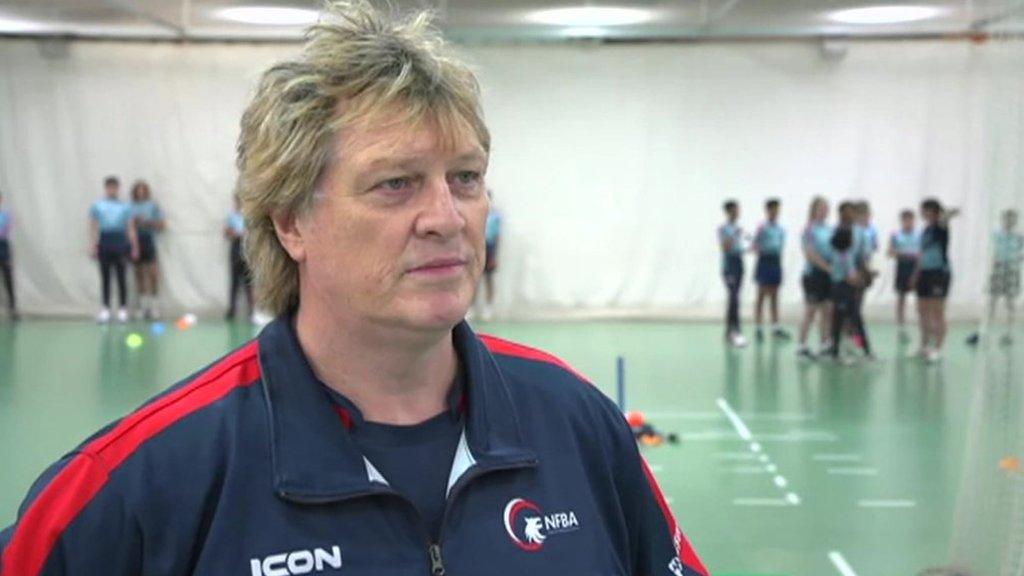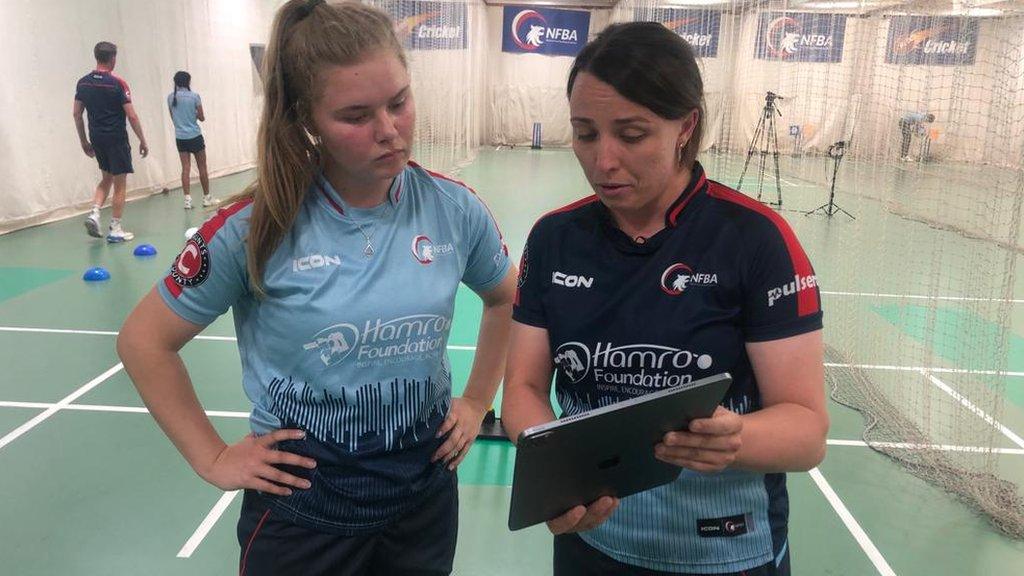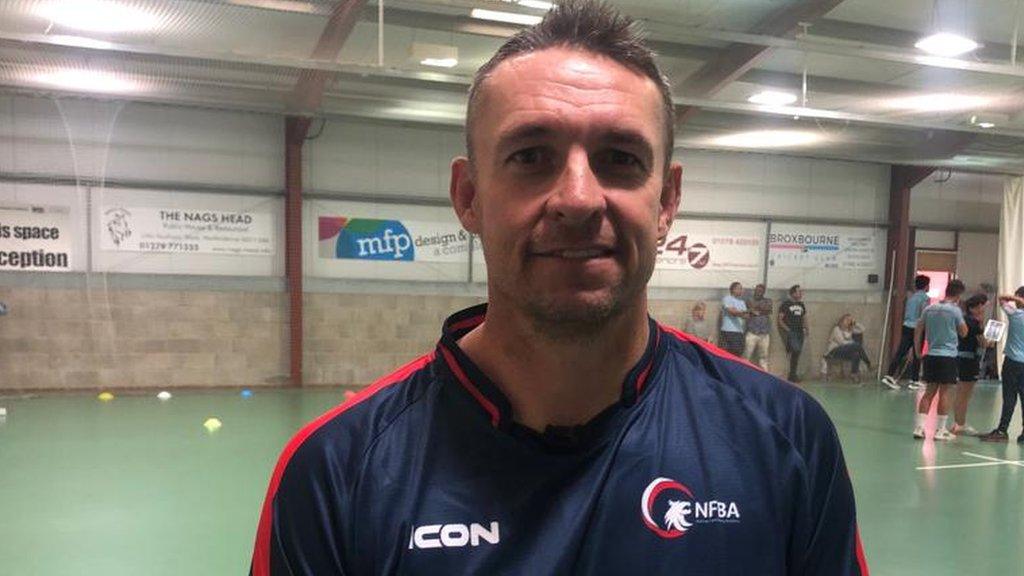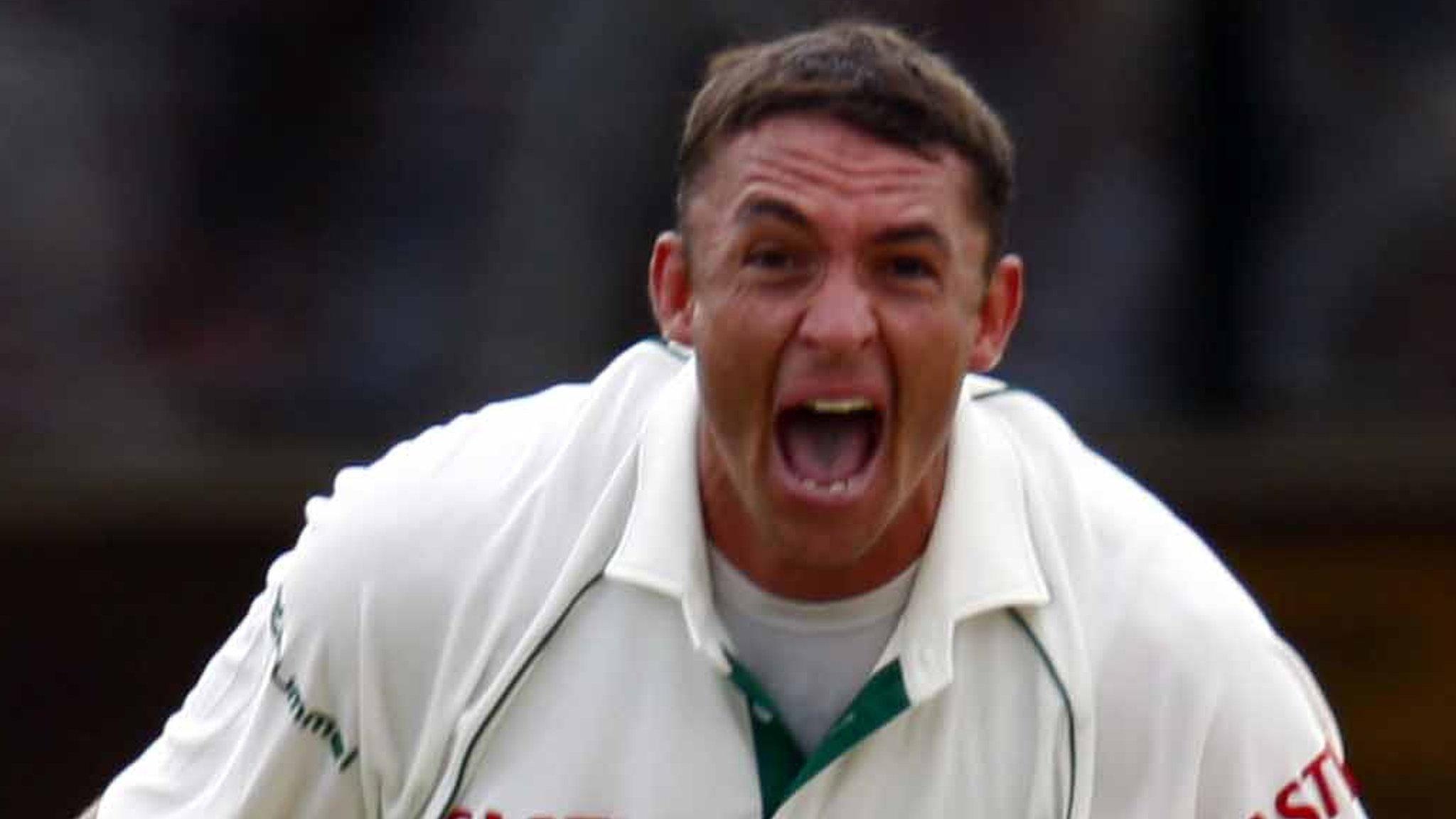Ian Pont: Coach at National Fast Bowling Academy on the benefits of raw pace
- Published
‘He causes so many problems!’ Watch Wood's three wickets
One of the most thrilling aspects of this summer's Ashes series has been the sight of England fast bowler Mark Wood roaring in and shaking up Australia with deliveries clocked at well over 90mph.
It has evoked memories of some of the great names of the past 50 years, including Malcolm Marshall, Michael Holding, Dennis Lillee, Imran Khan, Waqar Younis and Allan Donald, and highlighted the extra dimension real pace can provide in terms of spectator entertainment.
What are the reasons why some bowlers generate so much more speed than others? What are the additional stresses and strains bowling so quickly can put on the body?
One man who knows the answers to those, and other related questions, is Ian Pont, joint lead coach at the National Fast Bowling Academy (NFBA), based at Sawbridgeworth in Hertfordshire.
"The difference between (facing) 85 mph and 90mph is extraordinary," Pont told BBC Look East. "The difference between 90mph and 95 is ridiculous.
"What speed does, providing you bowl it in the right place, is it unravels the world's best batting techniques."
The 61-year-old's playing career, which included spells with Essex and Nottinghamshire, lasted throughout the 1980s.
But he also had try-outs as a pitcher for Major League Baseball teams in the United States and tried his hand - and arm - at the javelin before turning to cricket coaching.
A firm believer in biomechanics, he produced a book called The Fast Bowler's Bible in 2006 - "It's not a Harry Potter novel but it's a really good read", he told BBC Sport at the time.
Increase in numbers

Ian Pont took 70 wickets in 28 first-class matches during his career, with best figures of 5-73
The NFBA held its first winter sessions in 2018 with 68 bowlers in attendance, and that number is expected to be up to about 170 this year, and although the academy is not formally affiliated to the 18 first-class counties, its coaches are happy to work with their young seam bowling prospects.
"We set up the National Fast Bowlers Academy as a people's academy to give an opportunity to young fast bowlers, male or female, to come and get elite-level coaching which they may not normally have access to," Pont explained.
"The 18 first-class counties and minor counties do great work, but unless you are in that system, where do you get this expert coaching from?"
He continued: "We've currently got players on trial with first-class counties, playing second-team cricket, and we've already had two professionals from our group, so we are aiming to push people into first-class cricket where we can.
"We are five, 10 minutes from Stansted airport, we've got one player that flies in from Sweden to join us, we've had players from Denmark before now, we've had someone from Norway, so it truly is an international fast bowling academy."

Jasmine Westcott (left, with coach Cath Dalton) has been attending the academy since the age of 14
Cath Dalton, who played for England A and later Ireland at international level, is another senior coach at the academy and believes recent advances in the women's game mean it is a great time for girls to look to improve their bowling skills.
"When I was under 11 (level), I didn't even know England Women had a cricket team," she said.
"Social media has changed that and we now have professional contracts in this country so we're seeing a real boom in women's cricket.
"We saw a fantastic (Women's) Ashes series. Hopefully we can keep encouraging girls to improve and go to the next level.
"We try to make sure every player that comes through our door, by the time they leave are a much better bowler, in terms of their biomechanics, their body movement, their action, that's really important when you're bowling fast.
"We're trying to make them faster and we upskill them with slower balls and yorkers. All the different variations.
"In the women's game, as well as the men's, we know how important it is to have variation."
'Make peace with pain'
Coaching covers all technical and mental aspects of the fast bowlers' art, including basics like how to run quicker, which is overseen by Active Essex director Jason Fergus.
Former South Africa paceman Andre Nel also coaches at the NFBA and says he is "jealous" that a similar facility was not available to him as a young bowler.
"I was fortunate enough to figure out how my action worked and I brought something different to the game," the 45-year-old said.

Andrew Nel played 36 Tests, 79 one-dayers and two T20 internationals for the Proteas
So what are the key attributes that a fast bowler needs to succeed, apart from being, in Nel's words, "a bit funny, a bit crazy, a bit different"?
Nel, who also coaches at the NFBA, said: "You've got to be ruthless, you've got to be hungry for success and pain has to be your friend, 'cos fast bowling is hard.
"If you make peace with pain and have the technical ability to back it up, then you have to be a fighter, you have to be prepared to battle.
"Any fast bowler around the world nowadays, yes they all have different techniques and ways of doing things, but they are all hungry to get wickets - it all comes down to how big your heart is, to be successful. Fast bowlers have to have a big heart."
England have not had the best of luck with their 90mph bowlers - Jofa Archer has not been able to play a Test match since February 2021 because of injuries.
'No-one likes facing fast bowling'
But fast bowling can "change the momentum" in games, according to Nel.
"Who wakes up in the morning wanting to face bowling at 95mph? No-one. If you can do that, with a bit of skill, that's a recipe for success," he added.

Ian Pont had tryouts for baseball teams in New York, Philadelphia and other US cities
Pont shares that view and has been excited to see Wood add some real fire to the England attack after being brought into the team for the third game of the Ashes series at Headingley.
"We saw the difference Mark Wood made as soon as he came into that England set-up. Australia were on the back foot and suddenly the game was completely different," he said.
"The way we have played our cricket - I know people hate this term Bazball, but we play this very aggressive, very positive, sometimes brilliant, sometimes brainless cricket, and that is so entertaining.
"The games are happening fast, they're over quickly, you can't switch the TV off and think it'll be the same in half an hour or an hour as it used to be back 30 years ago, the game moves so quickly and it's fun.
"Hopefully we're encouraging a new generation of cricketers to come to the fore."
Interviews by BBC Look East's Jonathan Park
Related topics
- Published9 June 2023
